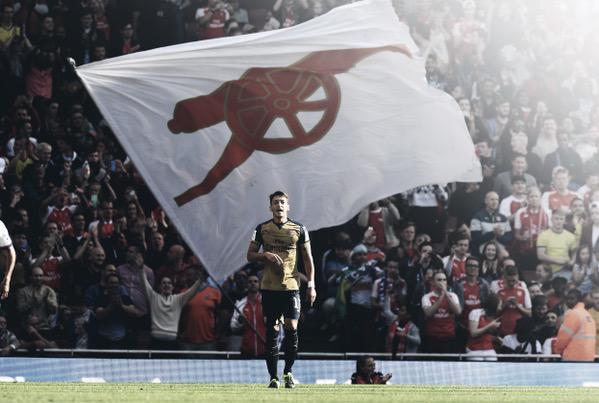It was on the 2nd of September 2013, the eve of an especially frantic transfer window, where Arsene Wenger finally broke his self-imposed reputation of ‘buy-little, sell-big’ and decided to bust the bank by buying a renowned German playmaker. Indeed, for a player of such calibre and reputation as Mesut Ozil, most fans would view the move as a sound investment when compared to the stupendous amounts of money the clubs around Arsenal were spending in order to strengthen their squads. They weren’t to be proven wrong.
Ozil’s mere presence boosted the morale of a team that had just lost their opening day 1-3 to a Villa side that would finish just three places off the relegation zone.
He proved the catalyst from the very beginning, providing a delightful assist to Olivier Giroud after just 11 minutes into his debut against Sunderland. Three weeks later, Ozil had a hand in all three goals Arsenal romped to a 3-1 home victory against a notoriously-hard-to-beat Stoke side. This left a lasting impression on the Gunners’ fans, and proved just what one world-class signing can mean to a team such as Arsenal.
True, his season didn’t turn out quite as magical as many would think- indeed, he hit a rough patch after the turn of the year. Suddenly, after a long honeymoon with both fans and media, he was under immense scrutiny by the latter. He was Ozil, Arsenal’s savior, and therefore everyone presumed he would have to score, assist or make a vital contribution to each game.
This couldn’t be further from the truth – it wasn’t Mesut’s style. Ozil’s assists come in clusters, as in he can seemingly go missing for two games and then in the third he can come up with an outrageous flick, or assist, and likewise in the fourth. Then, he’d go back to being passive Ozil, sometimes even described as lazy – an accusation which has been disproved by this simple stat: As of February 1st, on average, Ozil has run the most kilometers per game of any Arsenal player.
This assumption of him being lazy is merely one given to the classy and cool players, such as Andrea Pirlo, a player with different characteristics but similar to Ozil in the sense that they both give the illusion of not trying .
Fast-forward to the opening games of the 2015-16 season, and Ozil seems in prime shape. After a solid 2014-15 Season, in which he scored on four occasions and made a further five assists as Arsenal retained the FA Cup and finished 3rd in the Premier League, he seems in great form. Indeed, in his opening two games of this season, Ozil created 9 chances for his teammates, a Premier League high, and three times that of ex-Arsenal maestro Cesc Fabregas, who has had a slow start to his campaign.
Add Sportslens to your Google News Feed!
